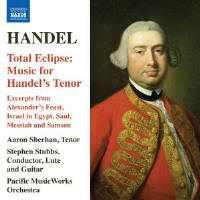Texte paru dans: / Appeared in: Naxos 8573914 |
|
|
Reviewer: Raymond
Tuttle
Although tenor Aaron Sheehan already has appeared on a number of discs (for example, with the Boston Early Music Festival), I think this is his first solo outing, and it is outstanding. A native of Minnesota, and a graduate of the Early Voice Performance program at Indiana University, Sheehan demonstrates that you do not need to be British to excel as a Handel tenor.
This program is called Total Eclipse: Music for Handel’s Tenor. The tenor in question is John Beard, who came to Handel’s attention in 1732, during a performance of Esther. (It is Beard who is depicted on the booklet cover, in a period painting by Thomas Hudson.) At that time, Beard was a chorister and still a teenager, but Handel was impressed by him, and soon started to compose roles with Beard in mind. The first was a small part in Il pastor fido (1734) and the Handel/Beard association continued with the other works represented on this CD, during a period ranging from 1736 (Alexander’s Feast) to 1742 (Samson). Sheehan is not the first modern singer to build a program around the repertory of a single singer from Handel’s time—remember Harmonia Mundi’s CDs devoted to Senesino (countertenor Drew Minter), Montagnana (bass David Thomas), Cuzzoni (soprano Lisa Saffer), and Durastanti (mezzo Lorraine Hunt) but he might be the first tenor to do so. Even if he is not, the idea has been carried out so well here that no other justification is needed.
Sheehan’s singing is musically stylish and emotionally persuasive. His voice has the appropriate weight and range of colors needed to create all of these different characters or moods. It is masculine but never brassy or blaring. It’s also exciting, and part of that excitement comes from Stephen Stubbs and the Pacific MusicWorks Orchestra. I liked Sheehan’s scornful (but not overdone) laugh in the introduction to “Thou shalt break them” from Messiah, and also Stubbs’s challen-gingly brisk tempo in the aria itself. Even at that tempo, Sheehan negotiates Handel’s florid writing with manly confidence. Ian Bostridge, for example, externalizes Samson’s anguish more in “Total eclipse!,” but I feel that Sheehan’s less histrionic approach better allows one to appreciate the beauty of Handel’s writing. In May 2019, Sheehan and Pacific Music Works will have given two live performances of Handel’s complete Samson, and I am hoping that Naxos availed themselves of the opportunity to record them for future release.
My understanding is that the musicians in Pacific Music Works are playing modern instruments in a historically informed way. This approach gives the group more flexibility than it would otherwise have, and the results, as heard here, are excellent. There are three first violins, three seconds, two violas, two cellos, and a violone. The ensemble is completed by one bassoon and two oboes, harpsichord, and organ. I always assumed the Stubbs was British, given his earlier work with groups such as the Hilliard Ensemble, but he was born in Seattle, so that is one more thing for Americans be proud of.
This is an
excellent team effort, but it is the polish and excitement of Sheehan’s
singing that make this CD a Want List candidate. | |
|
|
|
|
|
|
|
Cliquez l'un ou l'autre
bouton pour découvrir bien d'autres critiques de CD |
|




